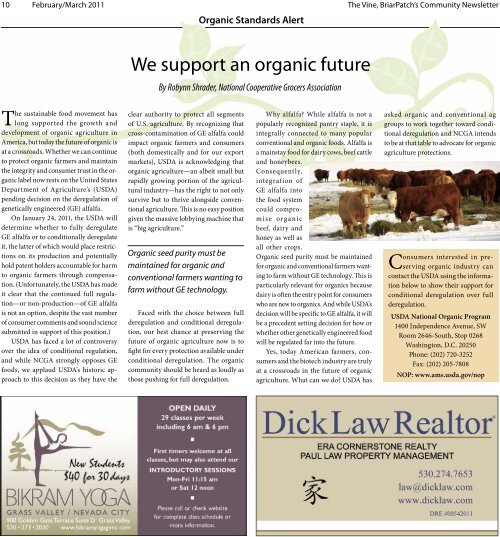Symbiotic Sustenance - BriarPatch Co-op
Symbiotic Sustenance - BriarPatch Co-op
Symbiotic Sustenance - BriarPatch Co-op
Create successful ePaper yourself
Turn your PDF publications into a flip-book with our unique Google optimized e-Paper software.
10 February/March 2011 The Vine, <strong>BriarPatch</strong>’s <strong>Co</strong>mmunity Newsletter<br />
The sustainable food movement has<br />
long supported the growth and<br />
devel<strong>op</strong>ment of organic agriculture in<br />
America, but today the future of organic is<br />
at a crossroads. Whether we can continue<br />
to protect organic farmers and maintain<br />
the integrity and consumer trust in the organic<br />
label now rests on the United States<br />
Department of Agriculture’s (USDA)<br />
pending decision on the deregulation of<br />
genetically engineered (GE) alfalfa.<br />
On January 24, 2011, the USDA will<br />
determine whether to fully deregulate<br />
GE alfalfa or to conditionally deregulate<br />
it, the latter of which would place restrictions<br />
on its production and potentially<br />
hold patent holders accountable for harm<br />
to organic farmers through compensation.<br />
(Unfortunately, the USDA has made<br />
it clear that the continued full regulation—or<br />
non-production—of GE alfalfa<br />
is not an <strong>op</strong>tion, despite the vast number<br />
of consumer comments and sound science<br />
submitted in support of this position.)<br />
USDA has faced a lot of controversy<br />
over the idea of conditional regulation,<br />
and while NCGA strongly <strong>op</strong>poses GE<br />
foods, we applaud USDA’s historic approach<br />
to this decision as they have the<br />
Organic Standards Alert<br />
We support an organic future<br />
By Robynn Shrader, National <strong>Co</strong><strong>op</strong>erative Grocers Association<br />
clear authority to protect all segments<br />
of U.S. agriculture. By recognizing that<br />
cross-contamination of GE alfalfa could<br />
impact organic farmers and consumers<br />
(both domestically and for our export<br />
markets), USDA is acknowledging that<br />
organic agriculture—an albeit small but<br />
rapidly growing portion of the agricultural<br />
industry—has the right to not only<br />
survive but to thrive alongside conventional<br />
agriculture. This is no easy position<br />
given the massive lobbying machine that<br />
is “big agriculture.”<br />
Organic seed purity must be<br />
maintained for organic and<br />
conventional farmers wanting to<br />
farm without GE technology.<br />
Faced with the choice between full<br />
deregulation and conditional deregulation,<br />
our best chance at preserving the<br />
future of organic agriculture now is to<br />
fight for every protection available under<br />
conditional deregulation. The organic<br />
community should be heard as loudly as<br />
those pushing for full deregulation.<br />
Why alfalfa? While alfalfa is not a<br />
p<strong>op</strong>ularly recognized pantry staple, it is<br />
integrally connected to many p<strong>op</strong>ular<br />
conventional and organic foods. Alfalfa is<br />
a mainstay food for dairy cows, beef cattle<br />
and honeybees.<br />
<strong>Co</strong>nsequently,<br />
integration of<br />
GE alfalfa into<br />
the food system<br />
could comprom<br />
ise orga n ic<br />
beef, dairy and<br />
honey as well as<br />
all other cr<strong>op</strong>s.<br />
Organic seed purity must be maintained<br />
for organic and conventional farmers wanting<br />
to farm without GE technology. This is<br />
particularly relevant for organics because<br />
dairy is often the entry point for consumers<br />
who are new to organics. And while USDA’s<br />
decision will be specific to GE alfalfa, it will<br />
be a precedent setting decision for how or<br />
whether other genetically engineered food<br />
will be regulated far into the future.<br />
Yes, today American farmers, consumers<br />
and the biotech industry are truly<br />
at a crossroads in the future of organic<br />
agriculture. What can we do? USDA has<br />
asked organic and conventional ag<br />
groups to work together toward conditional<br />
deregulation and NCGA intends<br />
to be at that table to advocate for organic<br />
agriculture protections.<br />
<strong>Co</strong>nsumers interested in preserving<br />
organic industry can<br />
contact the USDA using the information<br />
below to show their support for<br />
conditional deregulation over full<br />
deregulation.<br />
USDA National Organic Program<br />
1400 Independence Avenue, SW<br />
Room 2646-South, St<strong>op</strong> 0268<br />
Washington, D.C. 20250<br />
Phone: (202) 720-3252<br />
Fax: (202) 205-7808<br />
NOP: www.ams.usda.gov/n<strong>op</strong>


